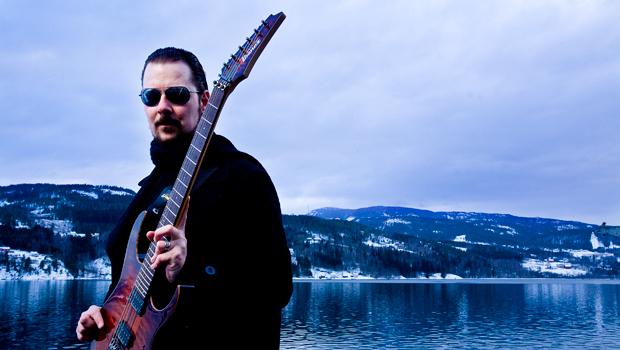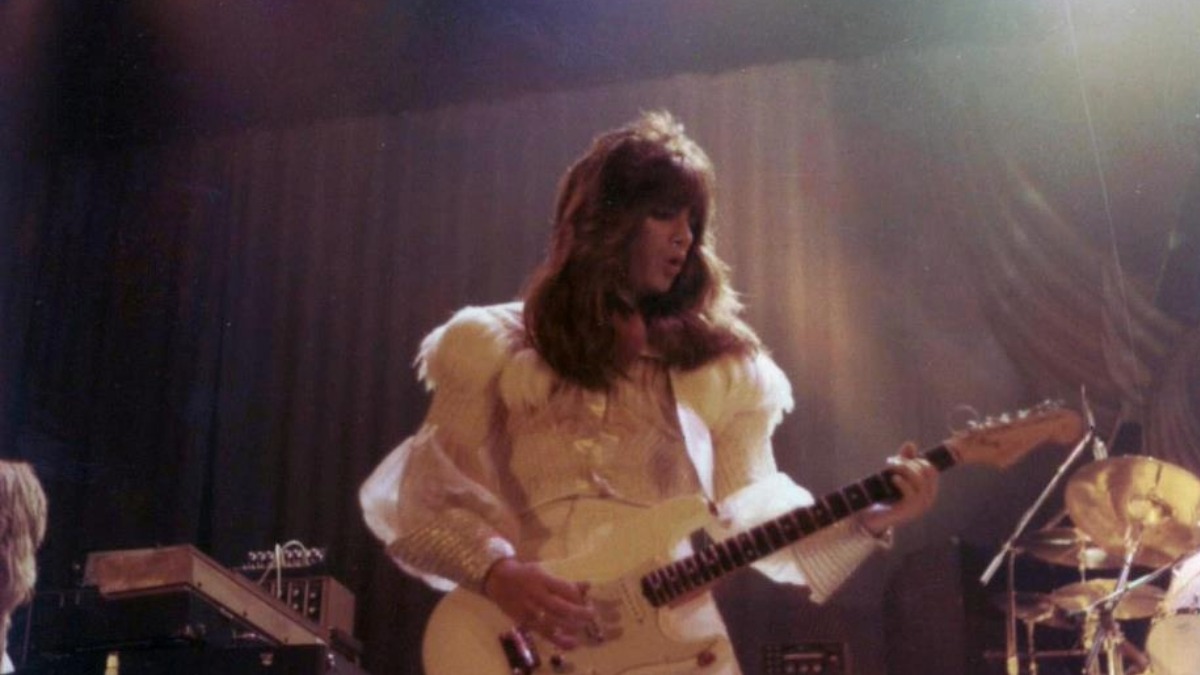Dear Guitar Hero: Ihsahn
All the latest guitar news, interviews, lessons, reviews, deals and more, direct to your inbox!
You are now subscribed
Your newsletter sign-up was successful

As the founding guitarist of Emperor, he rose from Norway’s notorious black metal scene to become a progressive metal luminary. His recent solo album, Eremita, features guest appearances by Devin Townsend and Jeff Loomis, but what Guitar World readers really what to know is…
What’s your main ax at the moment, and have you experimented with any new tunings or amp setups on the new record? —Sajith
There’s actually a big mix of guitars on the record. I’m using a six-string in drop-D and eight-strings, but mostly I’m using two Ibanez RGD seven-strings: a custom and factory model. They are longer scale and built for lower tunings. A lot of the material was written in drop-A tuning. Apart from that, my main sound is from my Blackstar heads. I have the Series One 200, and I have the 100-watt Artisan head, which sounds like a vintage Plexi. They’re very low noise and have great clarity. My ideal guitar sound is not just a wall of distortion but rather one that you can still hear the attack of the strings, even with heavy gain. So I’ve found a combination of those two amps works well. I often double-track stuff, so one trick that I’ll do is use the Blackstar ISF knob to change the EQ curve and make the tracks fit perfectly together.
You’ve said before that your previous solo albums—Adversary, Angl and After—were part of a trilogy. What can you tell us about the thematic or musical direction of the new record? —Nick Austin
After Emperor, I knew I wanted to give myself three albums to rebuild my musical foundation. Through that process I found out where I wanted to be musically: extreme metal but with more room for experimentation and new impulses. Even though Eremita is separate from the trilogy, it still builds on the elements found on the first three. Musically, it was natural to continue with eight-string guitars and using the saxophone. But it’s different than my previous album After, which had bleak landscapes, no life and a very open and meditative feel. Eremita takes images from old horror movies: there’s scraping and digging of a shovel, like someone burying something in the backyard. [laughs] It’s more from a paranoid escapist and madman’s point of view.
The album title is Latin for hermit. I’m drawn to figures that step outside [of conventions] and make up their own minds about things. Those kind of mythological figures appear all throughout my career, from Lucifer to Prometheus. And then there’s Nietzsche, who has been hugely influential to me. Back in his time he was like a philosophical hermit, and he also wrote a lot about my favorite hermit, Zarathustra. And in many ways I work in a hermetic way, so on many different levels Eremita was a very fitting title for this album.
You appeared on Jeff Loomis’ newest solo album, Plains of Oblivion. What was that collaboration like? Did you ask Jeff to play on your new record, Eremita? — Bryan Williamson
All the latest guitar news, interviews, lessons, reviews, deals and more, direct to your inbox!
As it happens, he does appear on Eremita. I first exchanged emails with Jeff through MySpace a few years back, simply to ask him about some amp and effect combinations he was using. Eventually, when he was working on his new album, he asked me to sing on the song “Surrender.” It was a killer song, and I was very honored by his request. The song structure was so powerful, which made it very easy to write lyrics and arrange a vocal part. The whole collaboration was really easy: they sent it to me, I wrote lyrics, recorded my vocals in my studio and sent it back.
When it came to my own album, I had done most of the solos already, and when I got to the section in “The Eagle and the Snake” I thought the riff would be perfect for Jeff’s style of playing. He was happy to return the favor and did a fantastic job putting all my other solos to shame. [laughs] He is an immense guitar player that goes so far beyond what most people can do. Adding that spice to the album was really great.
Back in the Nineties, was it ever difficult to maintain your artistic and individual identity during the media and political uproar surrounding the Norwegian black metal scene? —Nick Jones
Well, in the early Nineties, during all the turmoil, I was pretty much still a teenager. All of us in the scene felt very empowered by all the attention. With the amount of hate and resistance we were met with, we realized we could either bow to it and give up, or make that the source of the inspiration. That said, while black metal as a group didn’t fit in to society, I don’t think I ever really fit in within the black metal scene itself. It was [Emperor co-guitarist] Samoth who had the connections. Of course I knew people in the scene, but even back then I couldn’t relate to that collective either. My best friend back then, and still to this day, was Garm from Ulver. He also had a lot of connections but still did things his own way. And it shows in the different things he’s done with his music and how he’s stayed away from the nostalgic traditional black metal sound.
So to try and answer your question: At the time, our music was also hated by a lot of major media, and we were ridiculed beyond belief. Then, 10 years later, the same hated albums were held up as important. I experienced getting so much shit and so much praise for exactly the same thing! [laughs] So the most valuable lesson I learned was that you have to evaluate yourself in relation to yourself. The evaluation of people outside yourself will go up and down related to your amount of success. It’s hollow. If you expect all your happiness to come from outside, then you are putting your happiness in someone else’s power.
How do you stay motivated and focused during the writing of a solo album? Do you block out specific times of the day to work? —Matt T.
My lifestyle provides its own structure, which is to say I have children. [laughs] They have kindergarten and school, so for many years now the natural thing has been for me to work regular working hours during the day. My main focus or method, even before I begin writing, is to build the framework of the album and identify the sonic references I want to explore. The goal is to have the images in my head first, so I can keep the creative focus pointed in the right direction. That way I can explore a lot of textures and levels, but when it’s finished it feels cohesive. On this album I wanted to explore more block chord voicings in combination with using more classical compositional styles, like reworking motifs. I also wanted to bring in a lot of tight, dark brass sections, like on “The Eagle and the Snake.” Through all this I have my secret partner, my wife, Heidi [S. Tveitan, whose also performs as Star of Ash]. She’s really good with concepts and structure. I always bring her into my collection of abstract ideas, and she helps me form it into a framework. I really rely on her to be a musical sparring partner and a muse.
You have really distinctive singing styles, both clean and harsh. Which style took more work to perfect? And do you have any vocal tips you can share? —Luis Javier Minutti Robles
My black metal vocals have taken the longest time for me to develop. But now they have become the easiest for me, and when I record it’s usually in one or two takes. With the clean vocals I’m still very particular. I have a tendency to try and make it sound like something else, so I’ll layer it. It’s easier to hide behind black metal vocals, because clean vocals sound much closer to your real voice. And just like for most people, it’s very strange for me to hear my own voice played back to me. So I can’t really give advice for the clean singing. For black metal vocals, I’d say try to be economical with the power you put into it. Some people just scream their heads off and run out of air halfway through the line. So I’d say try to focus on the point in your throat where this sound emanates from, and use it economically…which really doesn’t sound like a badass black metal answer, does it! [laughs]
When you write songs do you start with guitar or some other instrument? —David Hollingsworth
I’ll occasionally use a keyboard, but I write the majority of the music on guitar. But I do not, like I used to, record the guitar parts first. Instead, I’ll program them into my computer, score it and play it back with a piano sound. That way it’s much easier to change keys, do block chord voicings and take a more structured approach to writing. I build the whole song—beginning to end—with just the piano sound. I figure if it works like that, it’ll work when I put the whole production on top of it. My ideal for this new album was to make it really hard hitting and big, but still expressive, dynamic and organic sounding. I wanted to have the sounds of the pick hitting the guitar strings, loud tube amplifiers and real drums. Actually, my drummer [Tobias Ornes Andersen] recorded the whole album to a click track just listening to my pre-programmed drum examples and the songs played with piano. That way I got his performance with all his imagination and no guitars or anything to lean on. He needed to drive the energy just with his playing. And that gave me a great foundation on which to add all the guitar layers.
Would you ever form another band, or are you happy staying solo? And do you think the project with Rob Halford will ever happen? —Nick Jones
I’ve never thought about forming another band. I’m so happy doing stuff on my own. I get to have all these great working partnerships with my live band and session musicians. As far as working with Rob Halford, honestly, I don’t know. We first talked about it in Oslo in 2006, and we exchanged ideas. He was already so busy at that time, and since then he’s rejoined Judas Priest. I haven’t talked to him in a long time, but I’d really love to do it, most definitely. I mean, who wouldn’t love working with the God of Metal? [laughs] So if you see him, please remind him that I’m still waiting!
